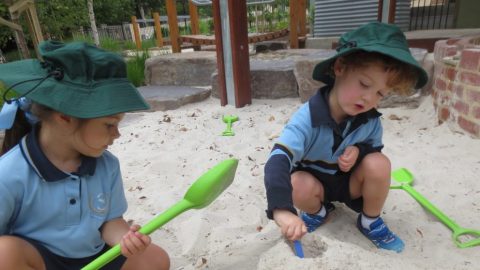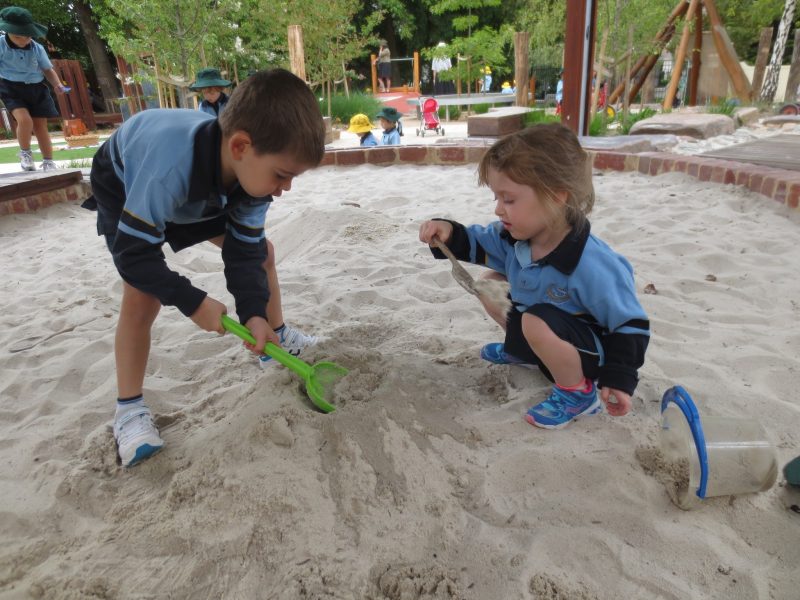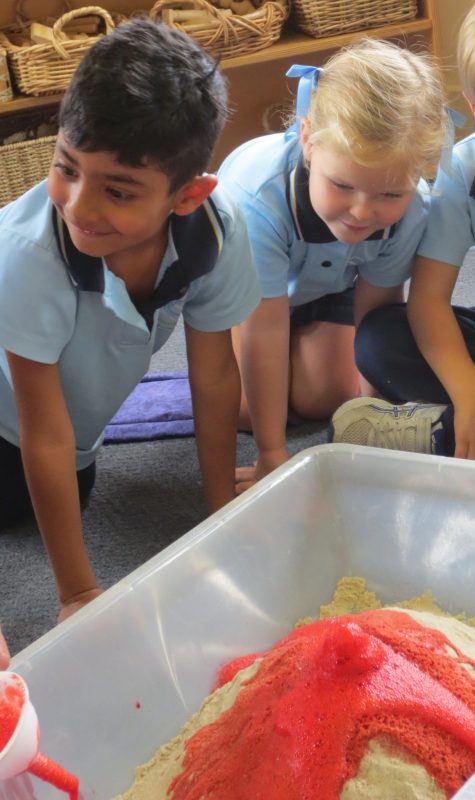Campbell House News

An Emerging Interest in Volcanos
Play is a context for learning and provides an endless number of opportunities for children to explore, discover, create and imagine and extend their thinking. As the Banksia children explore our playground, they are often incorporating imaginative play scenarios. Over the last two weeks, the concept of volcanoes and flowing lava has become a major interest. One of the children initiated the play and others were quick to join. The tree house became the volcano and the red surface around the slide depicted the ‘lava’ flowing down to the water. Several children decided to use buckets of water to cool the ‘molten rock’ whilst also enjoying running to escape the imagined danger. Sand play provided another dimension for the children to express their ideas as they constructed volcanos together. We then created our own erupting volcano by mixing baking soda with vinegar and red dye inside a sand volcano. There was great excitement as the ‘lava’ began bubbling and flowing down the sides of the volcano.
This imaginative play provides opportunities for the children to express their knowledge of the world, share ideas, and explore theories. Their conversations continually evolve as they engage in cooperative play and stimulate each other’s interest and involvement.
Volcanos are continuing to interest the children and they have now begun researching information through relevant pictures and books.
-

Joshua and Tilly using water to depict lava flowing from their volcano
-

Alexander and Avalon watching our volcano erupt
Penny Campbell
Banksia Room Teacher
The Importance of Connections and Relationships
On a daily basis in Campbell House, the educators can be observed and overheard explicitly encouraging and teaching young learners the essence of seeking to make meaningful relationships with other members of the group.
Shared and effective learning relies emphatically upon the building up of connections, information links and relationships with others.
Rich learning opportunities are readily available when children (and adults) relate and communicate with ease and confidence, respect and trust the shared ideas of many. Pursuing curiosities, interests and seeking answers to questions, reflecting upon and sharing experiences and hypothesising with those around us can lead to productive learning opportunities.
Strong connections with classmates and an emphatic feeling of being welcomed and valued in a learning or playing group are instrumental in the building of confidence and learning.
The Early Years Learning Framework (EYLF) identifies the imperative mature and importance of healthy connections to others and it is one of the five Outcomes identified by the EYLF:
Learning Outcome 2: ‘Children are connected with and contribute to their world’
- Children develop a sense of belonging to groups and communities and an understanding of the reciprocal rights and responsibilities necessary for active community participation.
- Children respond to diversity with respect.
- Children become aware of fairness.
- Children become socially responsible and show respect for the environment.
Early learning researchers such as Vygotzby and Malaguzzi believed that social learning preceded cognitive development. Malguzzi emphasises in many of his written articles and research, the importance of the learning environment and a child’s sense of belonging, comfort and confidence plays such a central role in making learning meaningful. Campbell House staff work with enthusiasm each day to assist the learners to build healthy connections and relationships.
Automaticity with such habits is the desired outcome. Campbell House staff constantly role model correct hand wasting techniques and remind young learners of the importance. We ask families to assist us with the practising of such habits at home on a regular basis.
Nut Awareness
St Catherine’s is a Nut Aware School and, as such, we ask that students do not bring nuts/ nut products (e.g. peanut butter and Nutella) to School. We have a number of students who are anaphylactic to nuts (of all varieties) within the School and we request all families observe the School Policy with regard to this matter.


